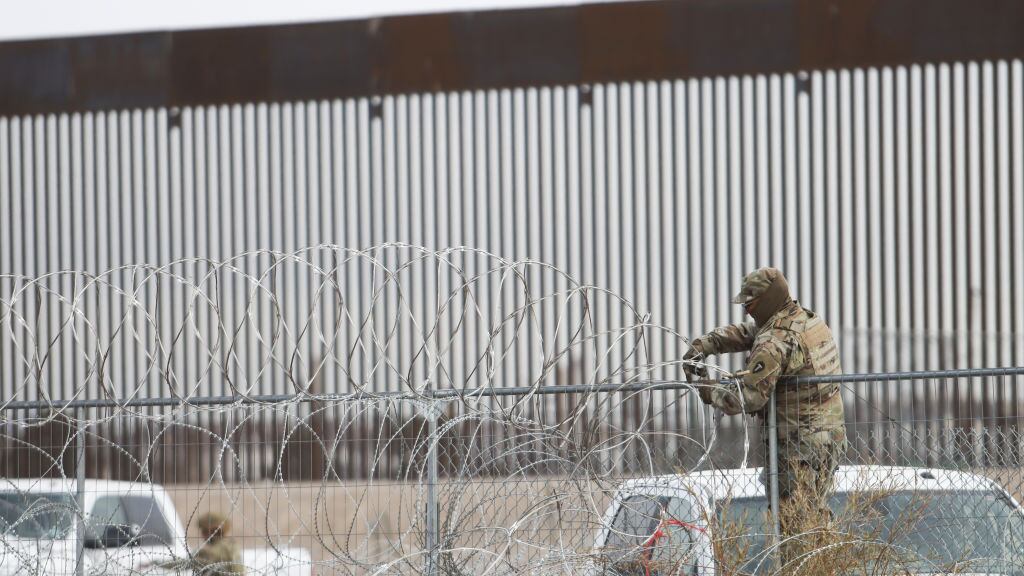A federal appeals court on Wednesday heard arguments on whether a new Texas immigration law should be allowed to go into effect—even while its constitutionality is still up for debate. The law, known as Senate Bill 4 (S.B. 4), would empower state and local authorities to arrest migrants who cross the border without authorization.
“Everybody is concerned about the border, there’s a real crisis going on here,” Texas Solicitor General Aaron Nielson said before the 5th U.S. Circuit Court of Appeals three-judge panel, according to The New York Times. “We are on the front line, and we are going to do something about it.”
The arguments between Texas and the Justice Department came just hours after the appellate panel ruled 2-1 that S.B. 4—signed in December by Texas Gov. Greg Abbott—should be temporarily blocked while they hear the case. Earlier on Tuesday, the U.S. Supreme Court cleared the way for the law to be enforced while challenges to it work their way through the appeals court.
The law would allow officers the right to arrest and charge anyone they believe has illegally entered Texas through its southern border—and would allow state judges to deport those people back to Mexico. The law seeks to make illegally crossing the border a Class B misdemeanor, which carries a sentence of up to six months in jail. Repeat offenders could face a maximum sentence of 20 years behind bars.
Mexico said Tuesday night that it would not “under any circumstances” accept migrants sent by Texas back over the border and condemned the law that they believe will exacerbate discrimination, racial profiling, and family separations.
The 5th U.S. Circuit Court of Appeals panel consists of Chief Judge Priscilla Richman, who was nominated by George W. Bush; Judge Andrew S. Oldham, a Trump nominee; and Judge Irma Carrillo Ramirez, who was nominated by President Biden.
On Wednesday, the panel did not issue a ruling on the appeal brought by Texas in the hopes of striking down a lower-court injunction that blocked the law. According to the Houston Chronicle, Judge Richman also took the time during the hearing to question whether it is a even state’s place to enforce immigration policy.
“Decisions of this nature touch on foreign relations and must be made with one voice,” Richman said after reading a 2012 Supreme Court decision that ruled the federal government has the power to enforce immigration laws. “It seems to me this statute washes that away.”
Only Oldham voted for S.B. 4 to go into effect on Tuesday during the appeals process. Richman and Ramirez voted to block the law for now.
Even after the appellate court issues its ruling, the legal case surrounding this controversial law is far from over. The Justice Department’s original lawsuit filed in Austin against the state of Texas is still pending.
In the lawsuit, the Biden administration challenged the constitutionality of the law, noting that immigration enforcement is up to the federal government. Attorney Daniel Tenny, who is representing the DOJ, argued Wednesday that immigration is “fundamentally an international exercise” and is a joint effort with other countries.
“The Supreme Court said the federal government has to have control over the immigration system,” Tenny said about the 2012 landmark Supreme Court ruling on an Arizona immigration law that similarly had tried to hand the power to enforce immigration laws to state and local authorities.
The state of Texas, however, has insisted that the law is a necessary response to the surge of migrants at the border. “Texas has a right to defend itself,” Nielson on Wednesday, adding that the state is trying to work with the federal government to enforce immigration laws.
“S.B. 4 is a modest but important statute,” Nielson argued. “It’s modest because it mirrors federal law. It’s important because it helps address what even the president has called a border crisis.”
But when Richman pressed Nielson on how the law would work in the state, he admitted he was not entirely sure how state courts would interpret it because a lower-court judge blocked it before it went into effect.
“This is the first time, it seems to me, that a state has claimed that they have the right to remove illegal aliens. I mean, this is not a power that historically has been exercised by states, has it?” Richman said, according to CNN.
Oldham then chimed in, questioning why the court should then block the whole law when it is not clear how it will play out.
“We have no clue about how any of this will be enforced because there's not a single person who’s been arrested,” Oldham shot back, according to the Chronicle. “We’re predicting all of this, and we have to say all of this is unlawful, so the entire thing can’t go into effect?”







